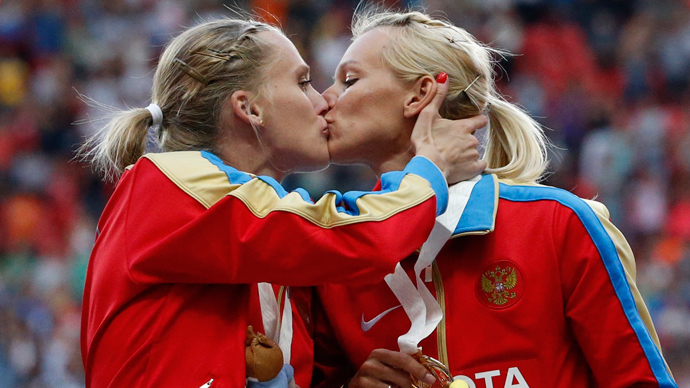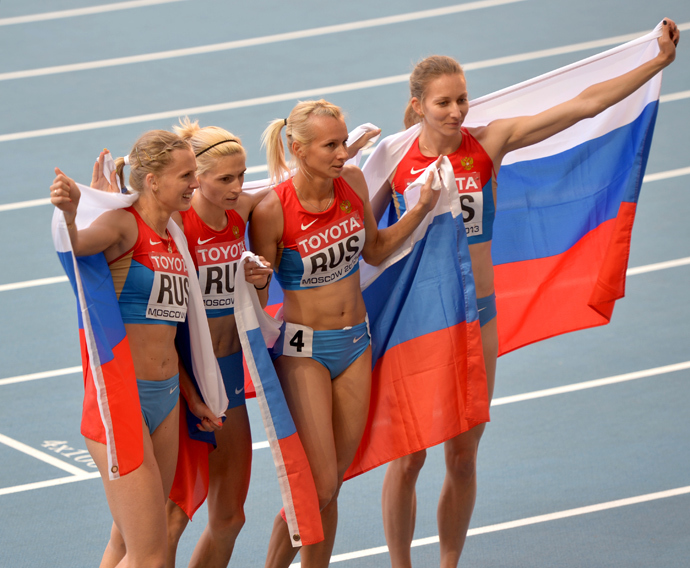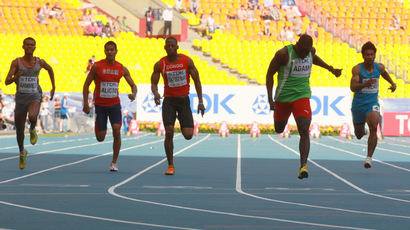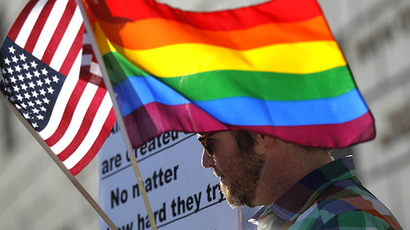Russian medalists ‘insulted’ at ‘gay claims’ over podium kiss

Russian gold medalists, Yulia Gushchina and Ksenia Ryzhova, are “shocked” the media construed their podium kiss as an act of protest against a law banning gay propaganda. The pair were insulted that attention was diverted from their sporting achievements.
The kiss that followed the sportswomen’s victory in the 4x400 women’s relay at the Moscow World Athletics Championships on Tuesday was widely interpreted by global press as an act of defiance against a bill banning gay propaganda to and in the presence of minors.
Both Ksenia Ryzhova and Yulia Gushchina were “shocked and
insulted” by the claims and stressed the kiss was nothing
more than a celebratory peck on the lips.
“It was a storm of emotions (after winning). And if at that
moment we touched lips... I don’t know in whose fantasy this all
gets thought up,” said Ksenia at an ItarTass news conference.
Yulia echoed her teammate’s sentiments, saying that the snapshot
was the product of the photographer’s “sick fantasies.”
“Yesterday, I was telephoned 20 times by various publications
and instead of congratulating me they decided to insult me with
these questions,” she fumed, quoted by the ITAR-TASS news
agency. She added that it was not just “insulting” for her
and her teammate, but also for their coaches.
“Myself and Yulia are both married and we are not having any
kind of relationship,” she stressed.
Controversy surrounding the Russian law against disseminating homosexual propaganda among minors has eclipsed the World Championships in Moscow.

Russia’s gold-medal-winning pole vaulter, Elena Isinbaeva,
entered the firing line when she made statements at a press
conference regarding the law.
She commented on a protest by Swedish athletes Emma Green Tregaro
and Moa Hjelmer, who painted their fingernails in rainbow colors
in support of LGBT rights.
"Maybe we are different than European people and people from
different lands. We have our law which everyone has to
respect,” Isinbaeva, 31, said at an English-language press
conference. “When we go to different countries, we try to
follow their rules. We are not trying to set our rules over
there. We are just trying to be respectful."
Her words were branded as “homophobic” and triggered a
flurry of criticism in the western press. Following the press
furor, Isinbaeva, clarified that she was against discrimination
towards sexual minorities and that she had been misunderstood.
“English is not my first language so it’s possible journalists
didn’t understand me,” said Isinbaeva. “I just wanted to
say that people should respect other countries’ laws.”
Russia’s Sports Minister, Vitaly Mutko, addressed international
controversy over the “gay propaganda” law on Monday.
Broaching the calls for a boycott of the Winter Olympics in Sochi
next February, he assured that no athletes or visitors at the
Sochi Olympics would suffer any infringements of their rights.
The legislation, enacted in Russia on June 30, introduces fines
for propagandizing non-traditional sexual relations to minors,
including in the media, on the internet and via viral adverts.
Critics of the legislation argue the law encroaches on the rights
of the LGBT community and the vague wording allows for anyone
voicing support for the movement to be persecuted.














